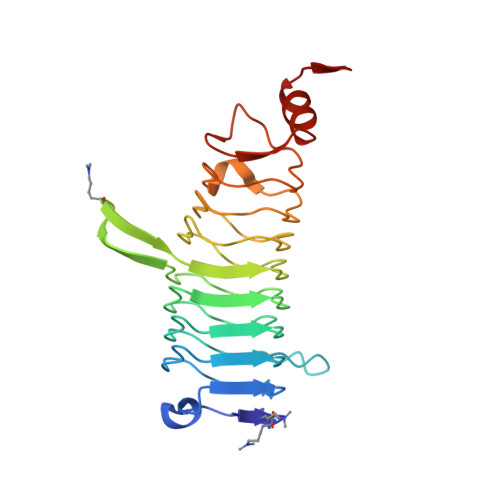Structural insights into quinolone antibiotic resistance mediated by pentapeptide repeat proteins: conserved surface loops direct the activity of a Qnr protein from a Gram-negative bacterium
Xiong, X., Bromley, E.H.C., Oelschlaeger, P., Woolfson, D.N., Spencer, J.(2011) Nucleic Acids Res
- PubMed: 21227918
- DOI: https://doi.org/10.1093/nar/gkq1296
- Primary Citation of Related Structures:
3PSS, 3PSZ - PubMed Abstract:
Quinolones inhibit bacterial type II DNA topoisomerases (e.g. DNA gyrase) and are among the most important antibiotics in current use. However, their efficacy is now being threatened by various plasmid-mediated resistance determinants. Of these, the pentapeptide repeat-containing (PRP) Qnr proteins are believed to act as DNA mimics and are particularly prevalent in gram-negative bacteria. Predicted Qnr-like proteins are also present in numerous environmental bacteria. Here, we demonstrate that one such, Aeromonas hydrophila AhQnr, is soluble, stable, and relieves quinolone inhibition of Escherichia coli DNA gyrase, thus providing an appropriate model system for gram-negative Qnr proteins. The AhQnr crystal structure, the first for any gram-negative Qnr, reveals two prominent loops (1 and 2) that project from the PRP structure. Deletion mutagenesis demonstrates that both contribute to protection of E. coli DNA gyrase from quinolones. Sequence comparisons indicate that these are likely to be present across the full range of gram-negative Qnr proteins. On this basis we present a model for the AhQnr:DNA gyrase interaction where loop1 interacts with the gyrase A 'tower' and loop2 with the gyrase B TOPRIM domains. We propose this to be a general mechanism directing the interactions of Qnr proteins with DNA gyrase in gram-negative bacteria.
- School of Cellular and Molecular Medicine, Medical Sciences Building, University of Bristol, University Walk, Bristol BS8 1TD, UK.
Organizational Affiliation:

















